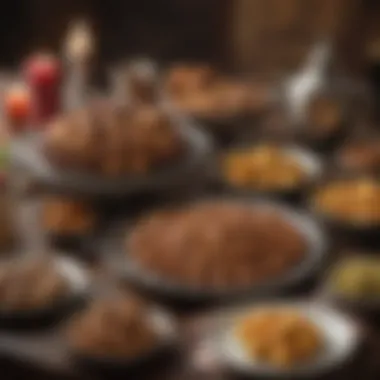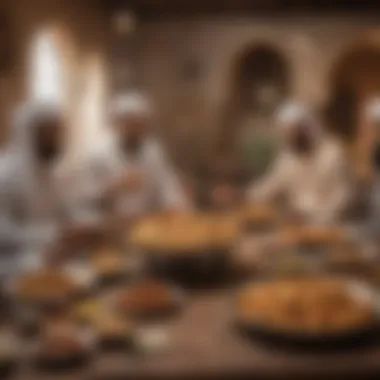Thoughtful Gift Ideas to Celebrate Ramadan Spirit


Intro
Gift-giving during Ramadan is a cherished tradition that holds significant cultural and spiritual value. It symbolizes generosity, reflection, and connection among families and communities. The act of exchanging gifts serves to strengthen social bonds and foster a sense of unity within a diverse set of relationships. This article aims to illuminate various thoughtful gift ideas that resonate with the spirit of Ramadan, catering to various recipients, from family members to friends and even acquaintances.
As the holy month progresses, the importance of gifts transcends mere materialism, embodying the concepts of compassion and charity. Thoughtful gifts can be practical, serve as gestures of kindness, or create memorable experiences. Thus, understanding the preferences and needs of your recipients can guide one in selecting the most appropriate gifts. This comprehensive guide seeks to assist readers in understanding the nuances of gift-giving during Ramadan, highlighting categories, personalization, and culinary considerations.
The narrative will address how to craft meaningful gifts, keeping in mind regional customs and dietary restrictions that often accompany Ramadan celebrations. Personalized gifts can illustrate extra care, allowing individuals to express their appreciation uniquely and thoughtfully. To further enhance the comprehension of this topic, the article will delve into both traditional and contemporary ideas that can enrich one's gifting experience during this auspicious month. Ultimately, this guide aspires to help readers honor the essence of Ramadan through meaningful gestures and presents.
Prelims to Gift Giving During Ramadan
Gift giving holds a special place in the observance of Ramadan, a holy month marked by fasting, reflection, and community. During this time, the act of gifting transcends mere material exchange; it embodies the spirit of generosity and compassion central to Islamic teachings. This article explores the significance of gift giving within Ramadan, highlighting how thoughtful gestures can enhance both personal relationships and community bonds.
When considering the importance of gift giving during Ramadan, it is essential to reflect on several key elements. First, gifts serve as a means to express love and appreciation among friends and family. They reinforce connections and remind recipients of the beauty of the relationships they cherish.
Additionally, giving gifts creates a sense of shared joy and celebration during the numerous iftar gatherings that punctuate the month. These moments of breaking fast together often feature an exchange of gifts, which adds to the festive atmosphere, symbolizing togetherness and support.
Moreover, the psychological benefits of gifting cannot be overlooked. The act of giving evokes feelings of happiness and fulfillment for both the giver and the recipient. This reciprocity is a powerful reminder of the importance of empathy and kindness that Ramadan encourages.
Ultimately, this article delves into various gift ideas and categories that respect the values of this sacred month, providing insight into how thoughtful gifts not only honor the spirit of Ramadan but also allow for deeper connections among loved ones.
Historical Context
Historically, gift giving during Ramadan can be traced back to the early days of Islam. The tradition stems from the Prophetic teachings that emphasize generosity and the importance of community. It is said that gifts were exchanged as signs of goodwill and respect, serving as a reminder of one’s obligations to help others. Over the years, this practice has transformed into a more structured way to show appreciation and strengthen bonds.
During Ramadan, the practice transcended mere gifting to symbolize a deeper commitment to charity and community welfare. As charitable acts gain prominence, many individuals choose to dedicate their gifts to those in need, expanding the spirit of giving beyond their immediate circle.
Cultural Significance
The cultural significance of gift giving during Ramadan varies across regions, influenced by local customs and traditions. In many cultures, the exchange of gifts becomes a family affair, with multiple generations participating in the act. Gifts are often wrapped and presented with care, demonstrating respect for the recipient.
Furthermore, in some cultures, specific types of gifts hold particular meanings. For instance, items such as dates, sweets, or traditional dishes are commonly shared, symbolizing hospitality and the rich culinary heritage associated with Ramadan.
In essence, the act of giving gifts encapsulates the values of generosity and kindness that Ramadan fosters. This tradition allows individuals to express their feelings in tangible forms, thereby nurturing both relationships and communal ties.
Understanding the Essence of Ramadan
The essence of Ramadan reaches deep into spiritual and communal practices that define this holy time. It is not merely a month of fasting, but an opportunity for personal growth and communal bonding. Understanding these themes is essential when considering thoughtful gifts that resonate with the values of Ramadan.
Spiritual Reflection
Ramadan encourages individuals to engage in spiritual reflection. During this month, Muslims focus on prayer, reading the Quran, and self-discipline. The practice of fasting is a significant aspect of this reflection. It acts as a reminder of the less fortunate, instilling a sense of empathy and charity. Gifts that align with this spiritual essence often hold deeper meaning. For instance, books containing religious texts or inspirational literature can inspire the recipient's journey of self-discovery.
In addition, items such as prayer rugs or even personalized Qurans serve as constant reminders of faith and devotion. These gifts emphasize personal growth and connection to spirituality, making them thoughtful and meaningful. Remember, the motive behind gifting stems from genuine intentions that reflect the urgency of self-improvement.
Community and Family
Community and family are integral to the Ramadan experience. This month fosters unity, bringing families and communities together through shared iftar meals, prayers, and gatherings. When selecting gifts, consider those that encourage collective experiences. For example, large serving dishes or cooking classes can facilitate meal preparation for family gatherings.
Moreover, gifts that strengthen family bonds add value. Customized family photo albums capture memories that will be cherished for years. Additionally, consider gifts that support community engagement, such as tickets to local events. These gifts enhance social interconnectedness and deepen the sense of belonging.
In summary, understanding the essence of Ramadan helps in selecting gifts that align with its values of spirituality, unity, and reflection. Such gifts honor the month in a meaningful way and encourage both self-improvement and collective experiences.
Categories of Suitable Gifts


In the context of Ramadan, selecting suitable gifts carries significant weight. This holy month is not just about individual reflection; it is also a time for sharing and fostering relationships. Gifts can play a vital role in expressing love, care, and appreciation toward friends, family, and community members. Understanding the various categories of gifts helps to ensure that choices are thoughtful, relevant, and aligned with the spirit of the month.
Practical Gifts
Practical gifts serve a dual purpose: they are functional and convey thoughtfulness. These gifts can greatly enhance daily lives, especially during Ramadan.
Cooking Tools
Cooking tools are an excellent choice during Ramadan due to their practical utility. They not only help in meal preparation but also signify care in cooking for loved ones during iftar. Essential cooking tools like high-quality knives or cooking utensils make the cooking experience smoother and more enjoyable.
Some unique features of cooking tools include ergonomic designs that promote comfort and efficiency. Versatile tools can serve multiple functions, further increasing their value. A well-chosen set of cooking tools can be a beneficial addition to any kitchen, especially when shared with those who appreciate cooking.
Home Essentials
Home essentials bridge the gap between necessity and comfort during Ramadan. Items such as decorative lanterns or beautifully designed dinnerware can elevate the atmosphere during family gatherings. These gifts emphasize the importance of home as a gathering place.
The unique feature of home essentials is their ability to create a warm, inviting environment for Ramadan celebrations. Such gifts are beneficial as they enhance the living space, but they should resonate with the recipient’s personal style and preferences.
Personal Care Items
Personal care items can be a thoughtful addition during Ramadan. These gifts encourage self-care and well-being, which are crucial in a month focused on both spirituality and health. Products such as skincare sets or calming teas promote relaxation during long fasting hours.
A distinctive aspect of personal care items is their ability to offer a sense of luxury and pampering at home, making them deeply appreciated gifts. However, care should be taken to consider the recipient's specific preferences, as personal care is subjective.
Thoughtful Gestures
Thoughtful gestures emphasize the personal connection in gift-giving. They express deeper sentiments and show effort beyond material gifts.
Handwritten Letters
Handwritten letters are a classic yet powerful form of expression. They convey sincerity that digital messages often lack. In the context of gifting, they can accompany a small token, reinforcing the personal touch.
The true value lies in the effort taken to articulate feelings and thoughts on paper. While modern convenience favors instant communication, a handwritten letter stands out, making it a cherished keepsake.
Customized Gifts
Customized gifts provide a tailored approach that reflects the recipient's personality. This can be in the form of personalized photo frames or monogrammed items.
The notable characteristic of customized gifts is their unique connection to the recipient. They can hold special significance, thus creating a lasting impression. However, it’s important to ensure that the customization aligns with the recipient’s taste to avoid any potential displeasure.
Charitable Donations
Charitable donations embody the true essence of giving during Ramadan. They not only benefit the recipient but also extend goodwill to those in need. This gesture aligns perfectly with the values of community support and generosity.
The unique feature of charitable donations is their potential to impact lives. While some may view them as less personal compared to physical gifts, the significance they carry can be profound and deeply fulfilling.
Experiential Gifts
Experiential gifts offer unique memories rather than physical items. They allow recipients to enjoy experiences, which often lead to lasting joy.
Cooking Classes
Cooking classes can be an engaging way to bond with family or friends. They provide the opportunity to share a meal, learn together, and discover new skills in the kitchen. This is especially relevant in Ramadan when culinary creativity is highly encouraged.
The interactive nature of cooking classes ensures they are enjoyable and memorable. However, it's essential that the recipient is enthusiastic about cooking to maximize the gift's impact.


Community Events
Community events foster a sense of belonging, making them perfect during Ramadan. Attending local events can strengthen ties within the community and offer shared experiences.
A notable attribute of community events is their inclusivity. They allow for participation from diverse groups, enhancing social bonds. However, the challenge lies in ensuring that events align with the recipient’s interests.
Virtual Experiences
Virtual experiences have become increasingly relevant. They provide flexible options for gift-giving and allow for engagement without geographical constraints. Options could range from virtual cooking sessions to online workshops.
The flexibility of virtual experiences means they can be tailored to the recipient's schedule. However, they may lack the personal touch of in-person experiences, which could be a drawback for some.
Understanding these categories of gifts ensures meaningful selections that enhance the Ramadan experience, making the process of gifting both thoughtful and fulfilling.
Culinary-Themed Gifts
Culinary-themed gifts hold a special significance during Ramadan. This month is not only a time for spiritual reflection but also an opportunity to come together with family and friends over food. Breaking the fast at dusk is a cherished tradition, and selecting gifts that enhance this experience can deepen connections and create lasting memories. Furthermore, these gifts celebrate the rich tapestry of culinary traditions associated with Ramadan, making them thoughtful choices that resonate with recipients.
Gourmet Food Baskets
One of the most appreciated gifts during Ramadan is a gourmet food basket. These baskets can be filled with an array of delights such as dates, nuts, and specialty teas or coffees. Dates, in particular, are essential in Ramadan, as they are often the first food consumed at iftar. Including a variety of both sweet and savory items offers balance and caters to different tastes. When assembling or purchasing a gourmet food basket, consider the dietary restrictions of the recipient. For example, you might include organic or gluten-free products to show attentiveness to their preferences. The presentation of these baskets is also key. Opt for beautiful packaging that reflects the spirit of Ramadan, creating a sense of celebration.
Traditional Ingredients
Traditional ingredients play an essential role in Ramadan meals. Gifting items such as saffron, sumac, or specialty olive oils can enhance the culinary experience. These ingredients are often used in traditional recipes that have been passed down through generations. By sharing these ingredients, you not only provide the recipient with unique flavors but also convey a message of cultural appreciation. It’s important to accompany these gifts with suggestions on how they can be used in Ramadan dishes, encouraging experimentation and creativity in the kitchen.
Cookbooks Featuring Ramadan Recipes
A cookbook that focuses on Ramadan recipes is another excellent gift option. It enables the recipient to discover new dishes and expand their repertoire with traditional and contemporary recipes that align with the month’s spirit. Look for cookbooks that not only include recipes but also offer context about the significance of each dish during Ramadan. These books often highlight the importance of sharing meals and the communal aspect of feasting. When selecting a cookbook, ensure it covers various dietary preferences and regional cuisines to cater to a diverse audience. A written note about personal experiences or favorite recipes can add a sentimental touch, making the gift more meaningful.
The joy of gifting during Ramadan lies in creating connections through food, enhancing both personal relationships and cultural understanding.
In summary, culinary-themed gifts are not just practical but also deeply meaningful. By thoughtfully selecting items like gourmet food baskets, traditional ingredients, and cookbooks, one can express care and appreciation, fostering a joyful spirit during this holy month.
Crafting Personalized Gifts
Crafting personalized gifts during Ramadan holds a special significance. These gifts stand out not only for their uniqueness but also for the thought and effort put into them. Personalization shows a deep level of care and consideration. It transforms a simple gift into a cherished memory that recipients can hold dear. Personalized gifts also strengthen emotions and connections among families and friends, aligning perfectly with the spirit of Ramadan.
The act of choosing or creating a personalized gift goes beyond the physical item. It demonstrates an understanding of the recipient's personality, preferences, and values. This meaningful approach increases the value of the gift. Moreover, personalized gifts can be imbued with cultural significance or specific memories that resonate deeply with the recipient. The attention to detail is what truly makes a gift special.
When considering personalized gifts, it is vital to keep a few things in mind. Think about what the recipient enjoys and what would bring them joy. This may include their favorite colors, hobbies, or experiences. Understanding the preferences can guide your choices and make the process of selecting a gift both enjoyable and fulfilling.
Incorporating Names or Initials
Incorporating names or initials into gifts is a popular way to add a personal touch. Items such as keychains, mugs, or decorative pieces can be customized easily to reflect the recipient. This particular detail speaks volumes about your intention to honor the individual.
Names or initials create a sense of ownership. They transform simple objects into exclusive items meant specifically for one person. For example, a hand-stitched embroidery with the recipient's name can be treasured for years. It uplifts the mundane and converts it into something meaningful.
Additionally, several online platforms offer services to engrave or print names on a variety of products. Accessing these personalized options is quite easy and can cater to specific budgets. Considering this step will highlight the effort put into the gift, making it more memorable.
Creating Photo Albums
Creating a photo album is another thoughtful idea for a personalized gift. It allows both the giver and the recipient to reflect on shared memories. A well-curated photo collection brings nostalgia and joy, especially during a time like Ramadan when family and community are emphasized.
Photo albums also provide a canvas for storytelling. Each image can illustrate a unique moment, a celebration, or a memory that matters. This makes the album a treasure trove of significant events in one’s life. With the advent of digital photography, it is easier now than ever to compile these memories. You can curate pictures from past Ramadan celebrations or family gatherings and carefully arrange them.


When designing a photo album, consider adding captions or dates. Adding these elements offers context and enhances the emotional impact of the gift. There are various services available that allow creative formatting and designing options. Personalized photo albums become charming keepsakes, rooted in feelings of gratitude, unity, and reflection—three central tenets of Ramadan.
Considerations for Gifting
Understanding the intricacies of gifting during Ramadan is paramount. This phase of reflection and connection encourages a careful approach to choosing presents. Every gesture is deeply rooted in personal and cultural significance. Taking into account what the recipient values creates a more meaningful gift experience.
Recipient's Preferences
When selecting a gift, the recipient's personal preferences must guide the choice. Every individual has distinct tastes and needs. Knowing whether the recipient prefers practical items or thoughtful gestures can steer your decision. It makes a significant difference. For instance, if someone enjoys cooking, a high-quality set of kitchen utensils may be appreciated.
Consider making inquiries about their likes or interests well in advance. Subtle conversations about their daily experiences or hobbies can reveal valuable insights. It is also prudent to consider their lifestyle. A busy professional might value time-saving kitchen gadgets, while someone else may cherish personalized gifts that show deeper thought.
The thought behind the gift is often more important than the gift itself.
Cultural Sensitivities
Cultural backgrounds also play a crucial role in the gift selection process. Understanding the values and beliefs of the person you are gifting is essential. Not all cultures interpret the same gift in a similar manner. Some might prefer tangible gifts, while others value experiences or acts of service.
It is wise to be cautious with certain gift types if they conflict with a recipient's beliefs. For instance, avoid gifts that feature alcohol or impermissible food items during Ramadan. Instead, opt for traditional items which may resonate better culturally, such as dates or prayer beads.
In addition, consider the symbolism associated with colors and practices. Different cultures may have distinct meanings attached to colors, and being aware of these nuances can prevent unintended misunderstandings.
How Gifts Reflect Ramadan Values
Gift giving during Ramadan transcends the mere act of exchanging items; it embodies deeper values integral to the spirit of the month. This section will delve into how the practice of gifting resonates with the fundamental principles of generosity, empathy, and gratitude. Such reflections not only enrich the giver’s and receiver’s experience but also foster community bonds and strengthen personal relationships.
Generosity
Generosity is a cornerstone of Ramadan. It is during this month that individuals are encouraged to extend their resources towards those in need. Gift giving becomes a direct expression of this value. When people choose gifts, they often consider not only the recipient's preferences but also their circumstances. By selecting thoughtful items, one shows an understanding of the other person's needs and wants. This transference of goodwill encourages a culture of sharing and opens channels for more profound connections.
Offering gifts that appeal to personality traits or hobbies can also represent personal generosity. For example, gifting a book on culinary skills can not only provide entertainment but also facilitate the recipient’s growth in the kitchen, further emphasizing the thoughtful aspect of giving. Such deeds inspire others to reflect on their own charitable inclinations and can create a ripple effect within the community.
Empathy
Empathy drives the decision-making process behind suitable gifts. Understanding the context in which one lives, especially during Ramadan, is crucial. The holy month can bring about challenges, including food insecurity or emotional struggles. By being attuned to these realities, gift-givers can select items that serve to uplift or comfort.
For instance, providing a care package filled with essentials can significantly uplift someone who might be struggling. Gifts that show care and understanding resonate deeply with recipients, affirming that they are seen and valued. Empathy in gift giving is not just about fulfilling a desire; it’s about responding to the emotional and spiritual needs that are often heightened during Ramadan. Each carefully chosen gift has the potential to remind the recipient that they are part of a larger community, which during Ramadan, is more important than ever.
Gratitude
Gratitude is another essential value during Ramadan. As individuals reflect on their blessings, they may feel inclined to acknowledge those who have impacted their lives positively. Gift giving becomes a medium through which gratitude can be conveyed. It becomes essential to select gifts that reflect appreciation—be it a heartfelt note, a specially chosen item, or a gesture like a shared meal.
In this context, gratitude manifests itself in the attention given to the gift. Handmade items or personalized notes often hold more significance than high-value material goods. These representations of gratitude encourage individuals to remember their relationships and express their appreciations fully.
"Gratitude turns what we have into enough." – Anonymous
Closure
The conclusion section of this article holds significant weight in summarizing the core themes and ideas presented throughout. Gift-giving during Ramadan is not merely a transactional act; it embodies values that are deeply rooted in the spirit of the month. By emphasizing the importance of thoughtful gift choices, this section aims to reinforce how selecting gifts can be a meaningful expression of love, respect, and community.
One key element to consider is the idea of connection. Gifts serve as tokens that bridge relationships, whether between family members, friends, or broader community ties. The act of giving fosters a sense of belonging and reinforces bonds that are central to the spirit of Ramadan. In understanding this, recipients are more likely to appreciate not just the gift itself but the intention and care behind it.
Additionally, this section stresses the need for mindfulness when choosing gifts. The gift should align with the recipient's values, preferences, and sometimes cultural nuances. In this way, the process of giving becomes an affirmation of understanding and harmony. It encourages gift-givers to reflect on what makes each individual unique.
Moreover, embracing the ideas put forth in this article cultivates a culture of empathy and generosity. As people engage in the act of giving, they also encourage others to partake, creating a ripple effect of kindness. This is particularly resonant during Ramadan, a month recognized for its values of compassion and community support.
"The essence of giving during Ramadan transcends the items exchanged; it reflects the love, thoughtfulness, and understanding shared among individuals."
Finally, the conclusion brings together the multifaceted nature of gift-giving during Ramadan. It synthesizes the insights on practical, thoughtful, and experiential gifts, all while steering clear of superficiality. By absorbing the lessons offered, readers can navigate their gifting journey in a way that truly respects and upholds the values of this sacred month.
In essence, the conclusion not only summarizes but also amplifies the message that thoughtful gift-giving during Ramadan is an art that enriches relationships and nurtures the spirit of the occasion.







